Music: A Symbol of Freedom
Zoe Wright, Public Relations Intern
From touching lives to conveying a national identity, music is extremely powerful. Music goes hand and hand with society; rebellious teenagers listened to rock and roll in the sixties while today’s rappers comment on political controversies in their lyrics. Music has always acted as an outlet for people and the Holocaust was no different.
During the Holocaust, music was used as a form of spiritual and cultural resistance against the Nazis. In fact, choirs, orchestras, and bands were formed in concentration camps. Nazis then forced prisoners to hold concerts for officials. However, Jewish musicians saw this as an opportunity to help guarantee their survival; if they could entertain, they had a chance of surviving. Small groups of musicians broke off the orchestras and rearranged beloved Jewish folk songs and religious spirituals. They would perform in secret to provide a temporary escape for the other prisoners.
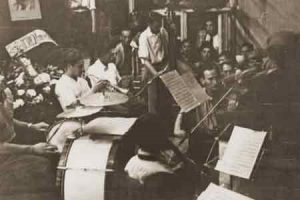
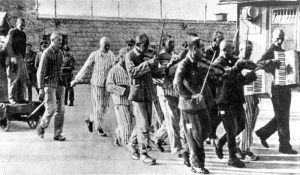
Music plays such a large role in Judaism and for some, music was all they had left, along with their faith, to practice their religion in secret. On the night of Kristallnacht, several hundred synagogues were destroyed. The wave of violence took place on November 9 and 10, 1938. As the horrific events occurred, people realized that the parchment from the Torah scrolls provided materials that could be used to make accessories, envelopes, and even musical instruments. Knowing that the Torah scrolls would be destroyed, people turned their religious texts into musical instruments. The Florida Holocaust Museum is home to a musical instrument made from the parchment of a Torah scroll, pictured below.
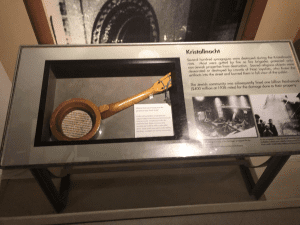
Many musicians were put into concentration camps. For example, playwright Jura Soyfer and composer Herbert Zipper were in Dachau, where they were forced to perform extremely hard labor such as pulling wheel barrows filled with bricks. In the concentration camps, musicians searched for bits of wood and metal to make musical instruments. A sympathetic Nazi guard hid wire under Herbert Zipper’s pillow so he could make strings for his instruments. They were able to craft 11 instruments.
As a response to the motto of the camp, “Arbeit Macht Frei” (Work Makes Freedom), Jura Soyfer and Herbert Zipper wrote Dachau Song in 1938. The song was learned by many inmates. Soyfer and Zipper wrote Dachau Song to preserve the prisoner’s self-respect and worth.
The lyrics of Dachau Song:
“Barbed wire, loaded with death
is drawn around our world.
Above a sky without mercy
sends frost and sunburn.
Far from us are all joys,
far away our homeland, far away our women,
when we march to work in silence
thousands of us at the break of day.
But we have learned the solution of Dachau
and became as hard as steel:
Be a man, comrade,
stay a human being, comrade,
do a good job, get to it, comrade,
for work, work makes you free!”
Soyfer and Zipper were transferred to Buchenwald a few weeks after they wrote Dachau Song. Unfortunately, Jura Soyfer died at the age of 26 due to typhoid fever. Zipper was rescued by his family. He was able to flee to Paris and then to the Philippines where he served as the conductor of the Manila Symphony. In 1942, the Japanese invaded the Philippines and Zipper was arrested and imprisoned again. He refused to play or conduct for occupying forces. He was imprisoned for four months. After his release he secretly worked for American forces with General Douglas MacArthur. Zipper sent Gen. MacArthur information about Japanese shipping through radio.
In 1946, Herbert Zipper immigrated to the United States. He touched many peoples lives as a conductor, composer, and music educator. Zipper founded and conducted the Brooklyn Symphony Orchestra. In 1953, he moved to Chicago and founded the Music Center of the North Shore and the National Guild of Community Music schools. In 1972, Herbert Zipper moved in Los Angeles, California to direct the School of Performing Arts of the University of California at Los Angeles. He passed away on April 21, 1997. His legacy lives on today and forever more.
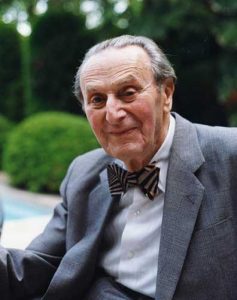
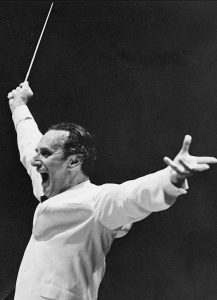
Holocaust survivors have spoken out about the importance of music as a form of resistance. Holocaust Survivor Roman Kent said, “Resistance does not have to be with a gun and a bullet.” People did whatever they could to stand against the horrific conditions they were facing. Yad Vashem, Israel’s official memorial to the Holocaust said, “the freedom to sing and compose music could not be totally censored or controlled. Thus, music become a symbol of freedom.”
I have personally experienced the power of music in relation to the Holocaust. I sang in a choir that had the opportunity to perform Even When He is Silent by Kim Andre Arnesen at the United States Holocaust Memorial Museum. The text for the piece was found in a concentration camp after World War II. The lyrics are, “I believe in the sun, even when it’s not shining. I believe in love, even when I feel it not. I believe in God, even when He is silent.” No one knows if these lyrics were sung out loud during the Holocaust, but today they are helping to keep the memory of the Holocaust alive. To be able to sing these lyrics in a memorial was a moment I will never forget.
The memory of the Holocaust has been kept alive through countless musicians. One rock and roll promoter did everything he could to ensure that a spirit of acceptance and equality would live on after he was able to escape Nazi Germany as a young boy. The Florida Holocaust Museum is proud to present the exhibition Bill Graham and the Rock & Roll Revolution this summer. Bill Graham and the Rock & Roll Revolution illuminates how Bill Graham’s childhood experiences as a Jewish emigrant from Nazi Germany fueled his drive and ingenuity as a cultural innovator and advocate for social justice. Bill Graham knew how impactful music is and used his incredible platform to spread equality. He went on to promote countless rock and roll musicians such as Santana, Allman Brothers Band, The Who, The Rolling Stones, Led Zeppelin, and Janis Joplin. To learn more about Bill Graham and the power of music during the Holocaust, be sure to visit The Florida Holocaust Museum.
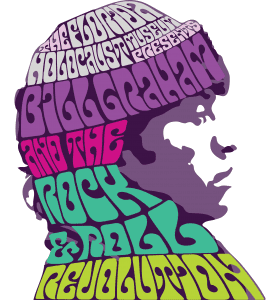
Bill Graham and the Rock & Roll Revolution opens to the public on August 18, 2018 and is on display through February 10, 2019.
